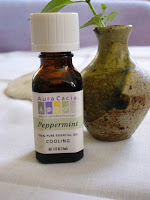Peppermint Oil for IBS

Irritable bowel syndrome (IBS) is a condition characterized by symptoms such as abdominal discomfort, bloating, gas, and altered bowel habits. In conventional medicine, there is no real consensus on what causes IBS.
IBS could be termed a “diagnosis of exclusion.” In other words, it’s the diagnosis that individuals end up with when tests have revealed there’s no conventional explanation for the symptoms (such as inflammatory bowel disease).
Underlying Causes of IBS
My experience in practice has led me to believe that IBS usually does have one or more specific underlying causes—it’s just that these tend not to be tested for or are not recognized by conventional medicine. I find the top two causes of this condition are food sensitivity and an imbalance in the organisms that inhabit the gut.
Despite conventional medicine’s generally poor understanding of IBS, certain strategies do exist for its treatment. For example, some health professionals will advise that individuals with IBS increase their intake of fiber. In practice, I’ve found that this makes many patients worse.
One potential explanation for this concerns wheat, which is, in my experience, a common triggering factor in IBS. And when individuals are advised to consume more fiber, they almost inevitably opt for more in the way of high-fiber breakfast cereals and breads that are based on wheat.
IBS Treatments
Fiber as a treatment for IBS has been studied, and a review of the available evidence has been published in the British Medical Journal this week [1]. There are two main sorts of fiber that have been studied in this context: bran (usually from wheat) and ispaghul (derived from plantain).
Bran was not found to bring a statistically significant reduction in the risk of persistent IBS symptoms, though ispaghul (also known as psyllium) did. Ispaghul was found to reduce the risk of persistent symptoms by 22 percent.
This review also looked at other strategies for IBS, including drugs that reduce spasm in the gut wall known as “anti-spasmodic.” Twelve agents were assessed, of which only five brought statistically significant improvements in symptoms.
Curiously, some drugs licensed for use for IBS (mebeverine, for example) did not seem to have any good evidence for them. Only two agents (otilonium and hyoscine, or scopolamine) showed, according to the authors, “consistent evidence of benefit.” Of these two, the one with the best evidence appears to be hyoscine.
Peppermint Oil
One final treatment assessed by the review was peppermint oil. This folksy remedy turned out to be better than placebo, reducing risk of persistent symptoms by more than half (57 percent).
Another way the effectiveness of a treatment can be assessed is to measure the “number needed to treat” (NNT—the number of individuals that need to be treated for one to get benefit). This review found the following NNTs for the treatments they assessed:
NNT for fiber: 11
NNT for antispasmodics: 5
NNT for peppermint oil: 2.5
Of these three main approaches for IBS, peppermint oil looks like the standout winner.
My preference is still to attempt to elucidate the true underlying cause of someone’s IBS symptoms rather than merely treating the symptoms. That said, peppermint oil represents a generally safe and effective option for those looking for some symptomatic relief from IBS.
References:
1. Ford AC, et al. Effect of fiber, antispasmodics, and peppermint in the treatment of irritable bowel syndrome. British Medical Journal 2008; 337;a2313
Dr. John Briffa is a London-based physician and author with an interest in nutrition and natural medicine. Dr. Briffa's Web site
Last Updated
Dec 11, 2008








0 comments:
Post a Comment